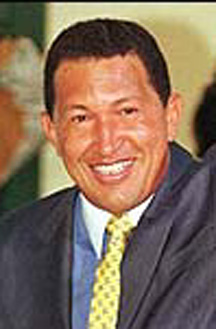CARACAS (Reuters) – Demands by Venezuela’s opposition for information on President Hugo Chavez’s health grew louder yesterday and bond prices rallied on speculation the socialist leader could be seriously ill.
The firebrand former soldier has not been seen in public since an operation in Cuba to remove an abscess from his pelvis on June 10, fuelling a torrent of rumours and uncertainty roiling South America’s biggest oil exporter.
The government says he is fine, some rivals believe he has prostate cancer, and others suspect it is all a strategy for him to return triumphant to Venezuela to host a regional summit on the country’s 200th anniversary of independence.

Opposition politicians, who will try to topple Chavez at an election next year, accuse the government of neglecting its constitutional duty to tell the people what is going on.
“After 21 days of Chavez’s absence the country is getting worse and the government remains abysmal,” former presidential candidate Manuel Rosales said in a statement.
“The nation needs a clear message that will end this national and international speculation, as well as the discomfort and suspicion caused by the mysterious silence.”
The saga has underlined the famously workaholic and baseball-loving 56-year-old’s total dominance of politics in the OPEC member, as well as the lack of any obvious successor.
A senior Venezuelan government source told Reuters that Cuban surgeons had operated on the president before peritonitis — a nonfatal inflammation of the lining of the abdomen — could develop, and that he was recuperating very well.
A US national security official said: “It’s a serious health problem, but he could very well recover from it.”
The South American country’s widely-traded sovereign debt rallied as some investors took the view that his ill health could mean lower policy and political risk premiums, and a better chance for the opposition next year.
“This is potentially the big trade for 2012. If you call this trade you make your P&L (profit and loss) for the year,” said Siobhan Morden, head of Latin America strategy at RBS.
But amid the contradictory reports and the allegations flying among Venezuela’s political players, some experts highlighted the lack of specific information.
“In terms of impact on Venezuelan debt, some see Chavez’s health and his ability to run for re-election as binary, while others are more cautious, uncertain of the implications of a potential power vacuum,” one Wall Street analyst told Reuters.
Investors will be focused on a deadline of sorts next week: Chavez is due to host the July 5-6 regional summit on the Caribbean island of Margarita that coincides with Venezuela’s 200th anniversary of independence from Spain.
And some see the silence surrounding his absence as a strategy to build up media attention ahead of that meeting. The only photos released of Chavez from Havana showed him sitting in a Venezuelan-flag tracksuit with his mentor Fidel Castro.
Russ Dallen, head trader at BBO Financial in Caracas, pointed out that both leaders were charismatic “showmen” who had disappeared in the past, waiting for supporters to clamour for their return before making an appearance.
“Did Chavez really have an operation? Probably. But wouldn’t his and Cuba’s government be trying to cover it up if there was something really to worry about — running previously unreleased tapes or soundtracks? Or more pictures,” he said.
The opposition front-runner to face Chavez at the polls next year told Reuters he also believed the mystery over the president’s health could be a ploy to maximize political gain from a triumphant return for the emotive July 5 anniversary.
“I picture him coming back saying the ‘gringo’ media had him dead and the Venezuelan opposition wished his death. It’s quite the reverse, and I say it as an aspirant to the post,” Henrique Capriles Radonski said in an interview.
